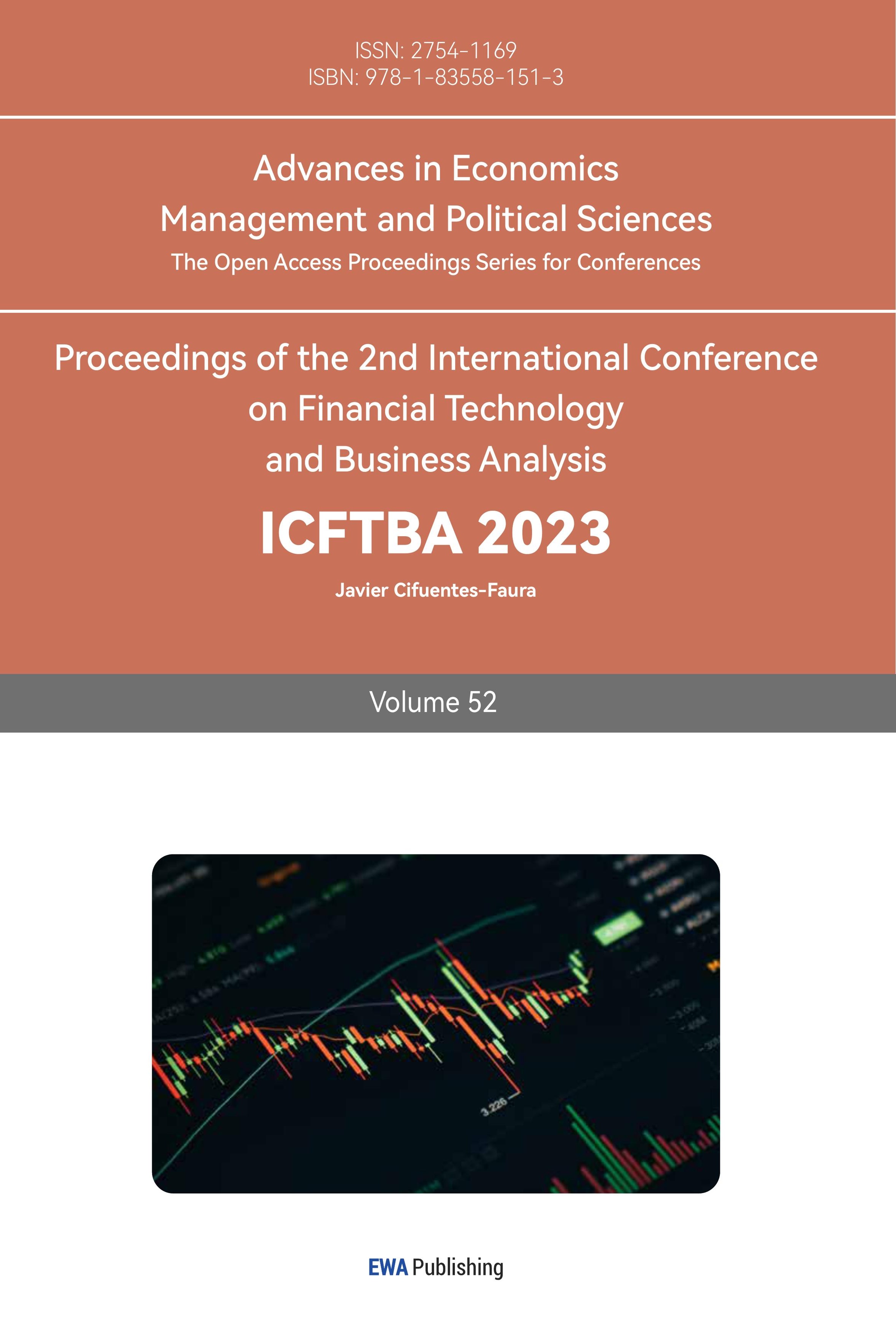1. Introduction
Oil spills not only have a significant impact on the Marine ecosystem, but also have a significant impact on the economic interests of mankind. These spills pose a serious threat to the delicate balance of Marine life and can lead to long-term environmental damage. Understanding the impact of oil spills on fisheries is essential to raising public awareness of environmental protection and to developing effective prevention and control measures.
Although a large number of studies have been conducted on the impact of oil spills on fisheries, most of them focus on the consequences or specific aspects, and there is a lack of research on the overall impact path. Therefore, this paper aims to study the impact path of Deepwater Horizon (DWH) oil spill on the fishery from the perspective of demand and supply, and explore the difference between the perceived impact process of oil spill on the fishery and the actual impact path, as well as the deviation between the impact result of oil spill on the fishery and the public perception.
The supply side analysis mainly focuses on two aspects. First, oil spills have been found to reduce fish populations in affected areas. Pollution of water and habitat disrupts the natural balance and leads to a decline in fish numbers. In addition, government efforts to stop fishing and clean up oil spills have also affected fish supplies. On the demand side, the spill has raised consumer concerns about the safety and quality of fish in the affected areas. This has led to a reduction in consumer demand for seafood, affecting the economic viability of local fisheries.
At the macro level, oil spills are more limited to short-term effects. However, the short-term effects do not mean that oil spills can be ignored, because the impact of oil spills on Marine ecology is profound and imperceptible. Therefore, some relevant policy recommendations were made based on these findings. For example, the establishment of a more strictly standardized deep-sea oil exploration access system, ecological protection red line and Marine ecological compensation system, the installation of more barriers and regular maintenance of equipment.
2. Analysis on the Pathways of DWH Oil Spill
2.1. Conceptual Framework
This article will analyze and verify the impact path of DWH on fisheries from both supply and demand perspectives. As shown in Figure 1, firstly, in terms of supply, there are mainly two aspects: fishery resources and government policies. Fishery resources point to biological resources such as fish, shrimp, and crabs. Under the chemical and physical effects of petroleum, the number of species decreases, affecting fishing catch; Government policy refers to measures taken by the government to close some water areas, prohibit fishing to avoid oil pollution, and clean up existing pollution. Secondly, the demand side is also divided into two aspects, namely commercial fishing and leisure fishing, explaining consumers' opinions and evaluations of these two types of fishing after the DWH event, as well as the corresponding changes in demand.
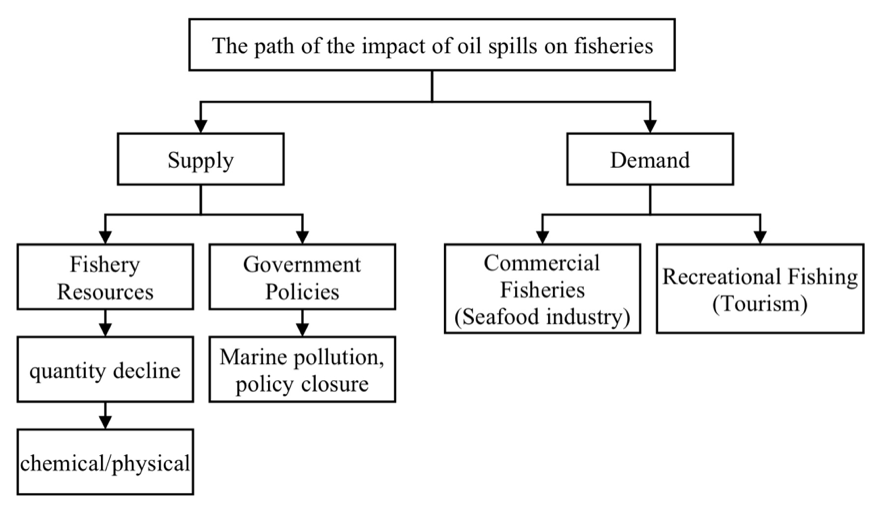
Figure 1: Analysis framework of impact paths.
2.2. Supply Side
Suppose that the influence path of the Deepwater Horizon oil spill (DWH) on the supply side of fisheries is roughly divided into two categories. From a public perspective, physical asphyxiation and the chemical toxicity brought by petroleum to marine life, leading to the reduction of fish landing, can definitely be the most noticeable and reasonable path. In addition, the government’s response to the DWH has also contributed to the fluctuations in the supply of fisheries. Among the measures have been taken by the local government, shutting down the fishing industry in certain areas was regarded as the most representative and far-reaching one. Therefore, the focus here will be on discussing whether oil spills have a significantly detrimental effect on fishery economy by means of fishery resources and government policies.
2.2.1. Fishery Resources
As an industry that relies heavily on natural resources, the ecological damage caused by the Deepwater Horizon oil spill has undoubtedly impacted the fishing industry.
First, a large amount of oil spills into the ocean, which by its very nature will cause physical suffocation or chemical poisoning of Marine life. There is no denying that the damage to Marine creatures such as fish and shrimp from oil spills is not as immediate and dramatic as the damage to mammals and birds, but that does not mean that the damage does not exist.
In terms of physical suffocation, more than 200 million gallons (4.9 million barrels) of crude oil leaked to the sea level in the Deepwater Horizon oil spill, resulting in a large area of oil film on the sea surface, and these oil films reduced the energy of solar radiation into the sea water, blocked the interaction of sea and air, directly inhibited the photosynthesis of Marine plants, and led to the decline of ocean oxygen content and biological suffocation. At the same time, the biological response to the oil spill can also cause suffocation, such as oysters, which are a kind of creature that will protect themselves from oil by closing their shells, and in warm water, oysters can suffocate within two days of closing their shells [1].
As for chemical toxicity, the representative toxic chemicals in crude oil are polycyclic aromatic hydrocarbons (PAHs), whose bio-accumulative properties make them a worrisome substance with long-term impacts on Marine life and ecology. According to studies, polycyclic aromatic hydrocarbons contained in crude oil have toxic effects on wild animals, including fish, benthic organisms and Marine vertebrates, such as carcinogenesis, cardiotoxicity, inhibition of fish reproduction, endocrine disturbance, and immune system dysfunction [2].
Additionally, oil spills will also destroy Marine habitats, such as oyster reefs, salt marshes, mangroves and so on, which will lead to the loss of physical function and even death of Marine organisms that live here and are important fisheries resources.
However, the negative impact of this approach on fisheries is limited. In fact, the consequences of oil spill poisoning fishery resources are mainly to affect consumers' evaluation of the fishery in this area, and lose their desire to buy fishery products and have fun through recreational fisheries. As to whether the number of commercially valuable Marine organisms poisoned can be reduced to the level that affects fishery income, Researchers lack relevant data to show that the oil spill has a significant negative impact on their recruitment (oysters, fish, crabs, shrimp, etc.) [1], so it is difficult to give an answer.
This is not just because the damage to Marine life from an oil spill is difficult to detect and measure, but also because the Marine life's own population base, reproductive capacity and development time are important factors. Hannah Lee points out that the decline in population levels of most animal species affected by oil spills is usually limited to a short period of time [3]. Compared with endangered mammals, Marine organisms have a larger population base, stronger reproductive capacity and shorter lifecycle. Take shrimp as an example, as the largest contributor to seafood income in the Gulf area (estimated to account for 52% of the total value of the terminal) [1], shrimp has a short life cycle, and even if it is polluted by oil, it can achieve the effect of detoxification through faster population renewal. Unless there is a sustained negative disturbance, shrimp will recover to the pre-spill population level in a relatively short time after the oil spill. Even because of government policies, the reduction of fishing pressure brought about by the long-term closure of fisheries has brought benefits to shrimp population development, and many fishermen have reported improved productivity after the oil spill [3].
2.2.2. Government Policies
It took BP 87 days to plug the leaking well after the Deepwater Horizon rig exploded in the Gulf of Mexico, showing how serious the ecological pollution caused by the Deepwater Horizon oil spill is.
One of the most profound government policies to affect fisheries in the DWH oil spill was the closure of waters. Officials in charge of fisheries programs at the Louisiana Department of Wildlife and Fisheries have acknowledged that the closures played a decisive role in the decline in shrimp, crab and fin fish harvests. In the wake of the Deepwater Horizon oil spill, multiple federal governments banned commercial seafood fishing in those areas, as well as products potentially affected by the spill from entering the supply chain [1]. Louisiana, Mississippi, Florida, and Alabama closed portions of the affected waters, with Mississippi closing nearly all (95%) of the Gulf's 88,522 square miles, followed by Louisiana and Alabama. Figure 2, which comes from a study about the impacts of the Deepwater Horizon oil spill on the Gulf of Mexico seafood industry [1], shows the average proportion of federal closed fisheries in the Gulf of Mexico after the DWH incident per month. It can be clearly seen that the closed area reached its peak in June, reaching 33%.
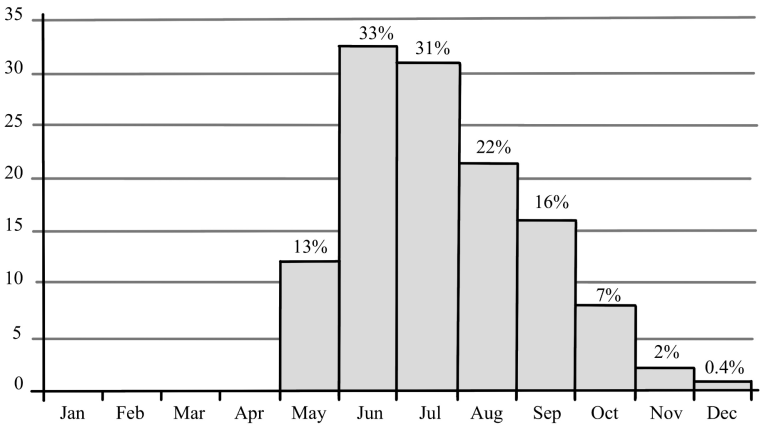
Figure 2: Monthly average of federal fishery closures in the Gulf of Mexico in 2010.
Shut down about half the water. The result of the closure of fisheries is to limit the production of local fishermen, which can be illustrated by the price data of seafood products. For example, the price of Gulf shrimp was higher in 2010 than in 2009, and this phenomenon is caused by the decrease in the supply of products caused by the closure of fisheries, demand exceeds supply and prices rise. It disrupts the seafood supply of processors, distributors and buyers, and once the seafood supply is interrupted, other nodes in the supply chain will seek the possibility of substitutes, such as imported goods, and eventually make it difficult for local fisheries to regain the market after the opening of the water area [4].
In addition to this, other measures taken by the government to clean up oil spills or avoid dangers have also had a significant impact on the fishing industry. For example, in order to protect the Louisiana bayou from oil invasion, the government adopted to release more fresh water from the Mississippi River into the estuary than usual, but this obviously changed the aquatic environment of the estuary, reducing the salinity of the river and causing large numbers of oysters to die[4]. The government's initial response to an emergency such as an oil spill is often poorly thought out and tested, which shows the importance of preventive measures.
2.3. Demand Side
The DWH event had a significant short-term impact on fisheries, both commercial and recreational. Refer to Figure 3, the spill affected about 20 percent of U.S. federal waters, there are more than 500 species of fish here, and they are spawning, such as bluefin tuna, red snapper, shrimp and oysters. The spill caused direct deaths, injuries and contamination of fish and shellfish, as well as indirect effects such as habitat degradation, disruption of food webs and behavioural changes.
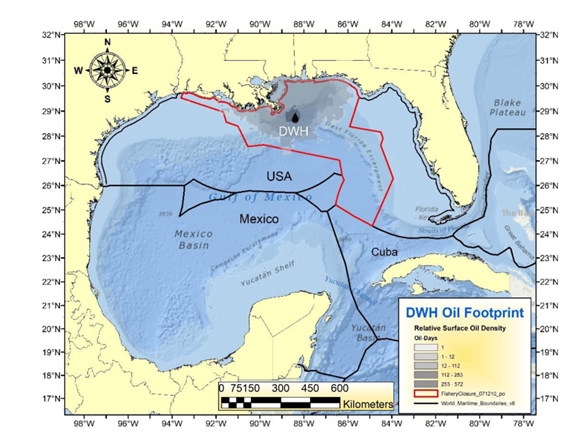
Figure 3: DWH oil footprint.
In the short term, consumer demand for fish products is reduced due to perceived or actual contamination of gulf seafood. According to one study, the DWH incident reduced demand for Gulf seafood by 9.8 percent in the first year after the spill and by 4.1 percent in the second year. Another study estimated that DWH events reduced U.S. demand for frozen seafood by 2.2% in the first year and 1.1% in the second year. These studies use different methodologies and data sources to estimate the demand impact of DWH events, but they all show that the seafood industry has been significantly negatively impacted at the demand level. The decrease in demand can be caused by several factors, such as media coverage, consumer perceptions, health concerns, and the availability of alternatives. Media coverage of DWH events has been extensive and often negative, showing images of oil-covered beaches, wildlife and seafood. This may have affected consumers’ perceptions of the quality and safety of Gulf seafood and reduced their willingness to buy [5]. Some consumers may also be concerned about the health risks of consuming seafood contaminated with oil or dispersants, especially for vulnerable groups such as pregnant women and children. In addition, consumers may have switched to other seafood or other types of protein sources that are not affected by DWH events, such as imported or aquaculture products, or poultry and beef.
On the other hand, refer to Figure 4, the spill has also affected recreational fishing, the oil spill has reduced the number of recreational fishing trips taken by consumers, as well as the quality and satisfaction of those trips. The information by The U.S. Tourism Agency estimates the economic impact of DWH on recreational fisheries could exceed $23 billion over three years, while tourism in the region supports more than 400,000 jobs and generates $34 billion annually. The spill has reduced visitor numbers, hotel occupancy and spending on tourism-related activities such as fishing, boating, dining and shopping. The spill has also tarnished the image and reputation of the Gulf Coast as a desirable destination for tourists, as many see beaches and waters as polluted and unsafe. The spill also affected the area’s cultural and natural heritage, such as wildlife, wetlands and historic sites [6].
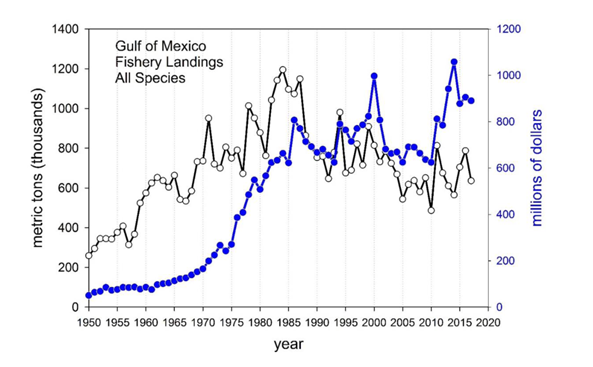
Figure 4: Gulf of Mexico fishery landings all species.
DWH events have had a short-term impact on demand-level fisheries as consumers reduce their consumption of Gulf of Mexico seafood due to perceived or actual contamination. It can vary by product type, region, and consumer group [7]. Some products, such as shrimp and oysters, may be affected more than others because of their higher exposure to oil or their higher share of the market from the Gulf. Some areas, such as the Bay State and nearby states, may experience a greater reduction in demand than others because of their proximity to the spill or a preference for local seafood. Some consumer groups, such as those with higher income or education levels, may respond more positively to DWH incidents than others because of their greater awareness or sensitivity to quality and safety issues [8].
The recreational and commercial fisheries have been working hard to recover from the impact of DWH events by implementing various strategies such as marketing campaigns, discounts and incentives, community events, and environmental restoration projects. The tourism industry has also received some financial assistance from BP and the federal government to mitigate damage and support recovery efforts. However, the recovery process has been slow and uneven, as some regions and sectors have been affected more than others. In the longer term, the long-term impact of the oil spill on tourism remains uncertain and depends on a number of factors, such as the duration of environmental damage, legal and regulatory outcomes, and consumer preferences and perceptions [9].
3. General Trend
Although the different impact paths of oil spills on fisheries from both supply and demand perspectives have been confirmed through previous research, it cannot be denied that even if oil spills have an impact on fisheries, their impact tends to be short-term rather than long-term. There have been studies predicting a total loss of $2-5 billion in the fishing sector in the Gulf of Mexico from 2010 to 2017 based on the timing of government closures and fishery recovery [9]. However, in fact, both overall and per capita commercial income is higher than expected, and the reasons and mechanisms for maintaining or even increasing commercial income after the DWH incident are still uncertain. As for entertainment income, it was due to fishermen not receiving the compensation they deserve, resulting in a decrease in income (the number of fishing trips showed an upward trend in 2010). Data from relevant study are shown in Figure 5 and Figure 6 below, which indicate the deviation (in millions of dollars) between the total business and entertainment revenue reported by states and the pre leak trajectory [10].
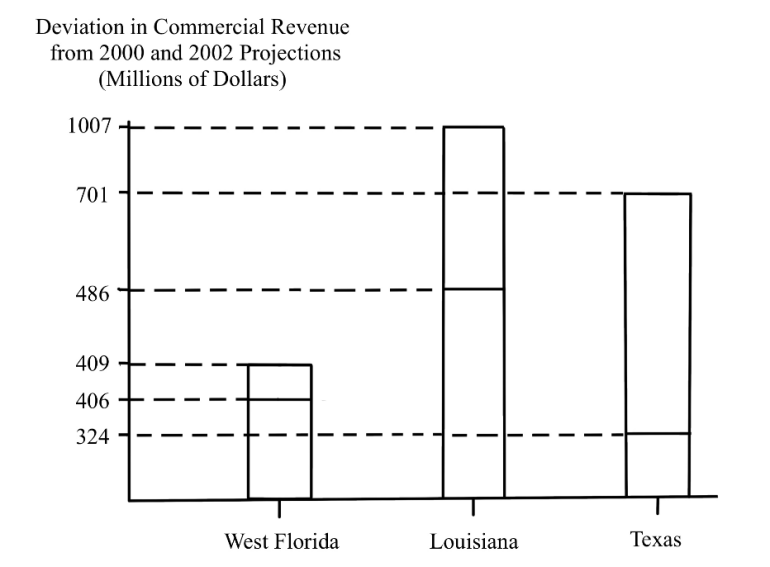
Figure 5: Deviation in commercial revenue from 2000 and 2002 projections.
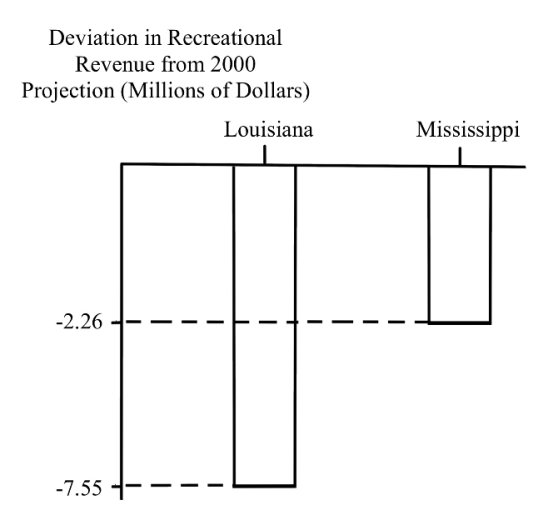
Figure 6: Deviation in recreational revenue from 2000 projection.
Overall, it is difficult to infer whether the DWH incident has a long-term and sustained negative impact on Gulf of Mexico fisheries. In other words, the impact path analyzed above is largely limited to the short term. In the long run, the mechanisms and influencing factors will be more complex and difficult to predict, such as the reproductive capacity of fish mentioned earlier, and the excellent opportunities provided for biological reproduction during fishery closures. Additionally, what was not mentioned, such as oil spills that can also harm predators, fish's instinctive response and migration to avoid pollution and so on.
However, the possibility of low expectations cannot be ruled out. In addition, even if there is no clear data to support the significant damage caused by the oil spill to the Gulf of Mexico fisheries, this cannot be a reason to ignore the harm caused by the oil spill. The operation and effectiveness of fisheries largely depend on human subjective initiative, and human efforts can sometimes compensate for losses and even create greater value. That is to say, the threats to the ecological environment and biological populations may not be reflected in the fishing industry. More channels are needed to pay attention to and manage oil spills, while focusing on the economy and protecting the environment.
4. Policy Recommendations
The access system for deep-sea oil extraction in the United States is not rigorous enough. Taking China as an example, in order to obtain a license for oil extraction and deep-sea operations in Chinese waters, companies must have the technology and equipment to deal with accidents, but the United States does not have similar regulations. Determine the ecological protection red line and marine ecological compensation system as the basic systems for marine environmental protection. This is not only a practical need, but also reflects the transformation of the concept of marine ecological environment protection from pollution prevention and control to the operational mechanism of ecological protection.
Projects focused on water quality restoration and management are carried out by many states, federal, non-profit organizations, and other entities, with a focus on habitat restoration and improvement, while also avoiding confrontational interactions during this process. For example, the transfer of mineral sediments can lead to changes in salinity, water quality, and substrate, which may be harmful to the persistence of swamps, oysters, and other estuarine biota in the diversion zone. The impact of improving water quality on fisheries, both commercial and recycling, and increasing consumer demand for fish products.
In addition, in order to prevent the occurrence of blowout accidents, more barriers need to be installed. In this event, Halliburton conducted two tests on foam cement in February 2010, both of which showed that its performance was unstable. There was no communication with BP. Later, Halliburton modified the experimental conditions, such as mixing time, and gave the results that both sides said were acceptable. However, this modification did not conduct targeted testing on the Macondo well. Therefore, the stability of foam cement cementing needs to be discussed. In addition, according to the data provided by Sperry Sun, the pressure display within more than an hour before the blowout was abnormal. Based on this, it can be inferred that there may be a kick situation, but no measures have been taken. The negligence in these companies' operations requires strengthened supervision through policy promotion.
5. Conclusion
To sum up, this paper analyzes the impact of the Deepwater Horizon oil spill on fisheries from both supply and demand perspectives. The 2010 Gulf of Mexico oil spill lasted 87 days and affected millions of Marine animals and plants, as well as the livelihoods of thousands of people who depend on fishing in the region. This paper uses data from different sources, such as NOAA, FAO, and BP, to examine how oil spills affect fishery stocks and government supply policies, as well as how it affects consumer demand for fish products and demand-side recreational fishing trips. The article found that the oil spill has a significant short-term impact on both commercial and recreational fisheries, but its long-term effects are uncertain and depend on many factors. Policy suggestions were put forward to improve the access system for deep-sea oil production, determine the red line for ecological protection and the compensation system for Marine ecology, and carry out projects focusing on water quality restoration and management.
There are also some limitations in this paper. For example, the statistical methods of the data are different, or the data are incomplete, which may affect the validity and reliability of the results. Second, this paper only discusses the impact of the Deepwater Horizon oil spill on fisheries from the perspective of demand and supply, without considering the impact on other Marine life, and the analysis is not comprehensive. Third, the research Angle of this paper is too one-sided. Based on the above shortcomings, I believe that some future studies can be carried out, including: first, longitudinal studies of the impact of oil spills on long-term fisheries resources, government policies, consumer demand and changes in recreational fishing. Second, analyze the impact of different types of oil spills on fisheries in different regions or countries. Third, explore the experiences and perspectives of different stakeholders involved in the fishing industry after the oil spill, such as fishermen, processors, distributors, consumers, tourists, etc., and make more use of data analysis.
Authors Contribution
All the authors contributed equally and their names were listed in alphabetical order.
References
[1]. Carroll, M., Gentner, B., Quigley, K., Dehner, L., and Perlot, N. (2016). An analysis of the impacts of the Deepwater Horizon oil spill on the Gulf of Mexico seafood industry. Retrieved from https://digital.library.unt.edu/ark:/67531/metadc955219/
[2]. Honda, M., and Suzuki, N. (2020). Toxicities of polycyclic aromatic hydrocarbons for aquatic animals. International Journal of Environmental Research and Public Health, 17(4), 1363.
[3]. Lee, H. (2011). Impacts of oil spills: Ecological, human health and economic. Retrieved from https://repositories.lib.utexas.edu/handle/2152/17526
[4]. Upton, H. F. (2011). The Deepwater Horizon oil spill and the Gulf of Mexico fishing industry, Congressional Research Service. In Library of Congress. Retrieved from https://sgp.fas.org/crs/misc/R41640.pdf
[5]. Fisher, C. R., Montagna, P. A., and Sutton, T. T. (2016). How did the Deepwater Horizon oil spill impact deep-sea ecosystems?. Oceanography, 29(3), 182-195.
[6]. Klinger, D. H., Dale, J. J., Machado, B. E., Incardona, J. P., Farwell, C. J., & Block, B. A. (2015). Exposure to Deepwater Horizon weathered crude oil increases routine metabolic demand in chub mackerel, Scomber japonicus. Marine pollution bulletin, 98(1-2), 259-266.
[7]. Alvarez, S., Larkin, S. L., Whitehead, J. C., & Haab, T. (2014). A revealed preference approach to valuing non-market recreational fishing losses from the Deepwater Horizon oil spill. Journal of environmental management, 145, 199-209.
[8]. Honda, M., & Suzuki, N. (2020). Toxicities of Polycyclic Aromatic Hydrocarbons for Aquatic Animals. International Journal of Environmental Research and Public Health, 17(4), 1363.
[9]. Sumaila, U.R., A.M. Cisneros-Montemayor, A. Dyck, L. Huang, W. Cheung, J. Jacquet, K. Kleisner, V. Lam, A. McCrea-Strub, W. Swartz, R. Watson, D. Zeller, and D. Pauly. (2012). Impact of the Deepwater Horizon well blowout on the economics of US Gulf fisheries. Canadian Journal of Fisheries and Aquatic Sciences 69:499-510.
[10]. Swinea, S. (2019). Economic impacts of the Deepwater Horizon oil spill. Retrieved from https://cdr.lib.unc.edu/concern/honors_theses/gm80j057f
Cite this article
Li,Y.;Liang,X. (2023). The Impact Path of the Gulf of Mexico Oil Spill on Fisheries – A Case of the Deepwater Horizon Oil Spill. Advances in Economics, Management and Political Sciences,52,239-247.
Data availability
The datasets used and/or analyzed during the current study will be available from the authors upon reasonable request.
Disclaimer/Publisher's Note
The statements, opinions and data contained in all publications are solely those of the individual author(s) and contributor(s) and not of EWA Publishing and/or the editor(s). EWA Publishing and/or the editor(s) disclaim responsibility for any injury to people or property resulting from any ideas, methods, instructions or products referred to in the content.
About volume
Volume title: Proceedings of the 2nd International Conference on Financial Technology and Business Analysis
© 2024 by the author(s). Licensee EWA Publishing, Oxford, UK. This article is an open access article distributed under the terms and
conditions of the Creative Commons Attribution (CC BY) license. Authors who
publish this series agree to the following terms:
1. Authors retain copyright and grant the series right of first publication with the work simultaneously licensed under a Creative Commons
Attribution License that allows others to share the work with an acknowledgment of the work's authorship and initial publication in this
series.
2. Authors are able to enter into separate, additional contractual arrangements for the non-exclusive distribution of the series's published
version of the work (e.g., post it to an institutional repository or publish it in a book), with an acknowledgment of its initial
publication in this series.
3. Authors are permitted and encouraged to post their work online (e.g., in institutional repositories or on their website) prior to and
during the submission process, as it can lead to productive exchanges, as well as earlier and greater citation of published work (See
Open access policy for details).
References
[1]. Carroll, M., Gentner, B., Quigley, K., Dehner, L., and Perlot, N. (2016). An analysis of the impacts of the Deepwater Horizon oil spill on the Gulf of Mexico seafood industry. Retrieved from https://digital.library.unt.edu/ark:/67531/metadc955219/
[2]. Honda, M., and Suzuki, N. (2020). Toxicities of polycyclic aromatic hydrocarbons for aquatic animals. International Journal of Environmental Research and Public Health, 17(4), 1363.
[3]. Lee, H. (2011). Impacts of oil spills: Ecological, human health and economic. Retrieved from https://repositories.lib.utexas.edu/handle/2152/17526
[4]. Upton, H. F. (2011). The Deepwater Horizon oil spill and the Gulf of Mexico fishing industry, Congressional Research Service. In Library of Congress. Retrieved from https://sgp.fas.org/crs/misc/R41640.pdf
[5]. Fisher, C. R., Montagna, P. A., and Sutton, T. T. (2016). How did the Deepwater Horizon oil spill impact deep-sea ecosystems?. Oceanography, 29(3), 182-195.
[6]. Klinger, D. H., Dale, J. J., Machado, B. E., Incardona, J. P., Farwell, C. J., & Block, B. A. (2015). Exposure to Deepwater Horizon weathered crude oil increases routine metabolic demand in chub mackerel, Scomber japonicus. Marine pollution bulletin, 98(1-2), 259-266.
[7]. Alvarez, S., Larkin, S. L., Whitehead, J. C., & Haab, T. (2014). A revealed preference approach to valuing non-market recreational fishing losses from the Deepwater Horizon oil spill. Journal of environmental management, 145, 199-209.
[8]. Honda, M., & Suzuki, N. (2020). Toxicities of Polycyclic Aromatic Hydrocarbons for Aquatic Animals. International Journal of Environmental Research and Public Health, 17(4), 1363.
[9]. Sumaila, U.R., A.M. Cisneros-Montemayor, A. Dyck, L. Huang, W. Cheung, J. Jacquet, K. Kleisner, V. Lam, A. McCrea-Strub, W. Swartz, R. Watson, D. Zeller, and D. Pauly. (2012). Impact of the Deepwater Horizon well blowout on the economics of US Gulf fisheries. Canadian Journal of Fisheries and Aquatic Sciences 69:499-510.
[10]. Swinea, S. (2019). Economic impacts of the Deepwater Horizon oil spill. Retrieved from https://cdr.lib.unc.edu/concern/honors_theses/gm80j057f





